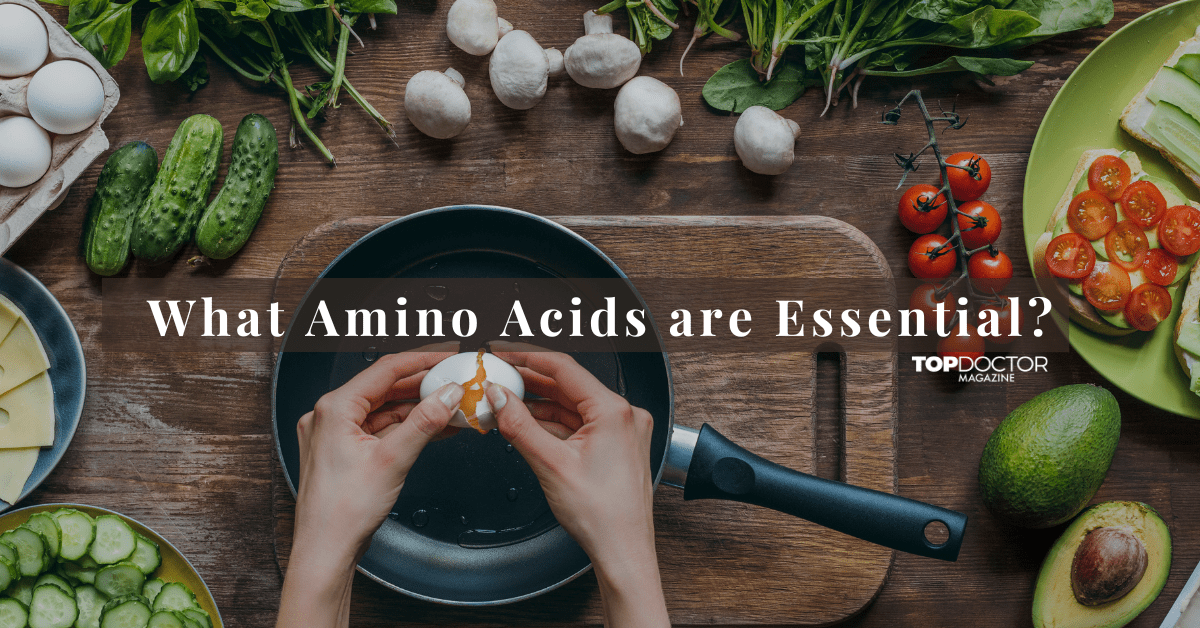You are what you eat, which is why both healthy and junk foods will leave a clear mark on your body. Your body is like a machine that needs all kinds of nutrients to function correctly, and the food you eat will heavily influence the type and quality of these nutrients. Some of these essential nutrients are amino acids, whose roles inside the human body differ based on their importance.
What is an Amino Acid?
Amino acids are the essential building blocks of proteins for many vital biological processes. There are two main groups of amino acids: essential and non-essential. Essential amino acids are those that the human body cannot produce independently, so we must get them from our diet. On the other hand, the human body can produce non-essential amino acids, although diet supplementation becomes necessary for non-essential amino acids as well.
Amino acids are essential for a variety of bodily functions, including:
- Acting as building blocks for proteins;
- Assisting the creation process of enzymes;
- Regulating metabolism;
- Supporting the immune system;
- Facilitating detoxification;
- Aiding in cell repair and growth.
Dealing with an Amino Acid Deficiency
Amino acid deficiencies can lead to adverse health effects, including weakened immunity, poor wound healing, decreased energy levels and impaired brain function. Make sure that you are getting enough essential amino acids in your diet by consuming a variety of protein-rich foods such as meat, poultry, fish, eggs, dairy, nuts and seeds. You can also get all of the essential amino acids from plant-based proteins such as quinoa, soy and hemp.
What Amino Acids are Essential for the Body?
Twenty amino acids are essential to human health, and of those, nine are considered essential. Essential amino acids cannot be synthesized by the body and must be obtained from the diet.
The nine amino acids types that the body cannot synthesize on its own and must be obtained through diet are:
- Histidine: This amino acid is vital for tissue growth and repair. It is also needed to produce hemoglobin (i.e., the molecule in red blood cells that carries oxygen around the body).
- Isoleucine: This amino acid assists the synthesis of proteins, enzymes and hemoglobin.
- Leucine: Leucine plays a vital role in building muscle tissue, regulating blood sugar levels and increasing energy.
- Lysine: Lysine helps the body build muscle mass and absorb calcium. It also helps fight off viruses that cause cold sores.
- Methionine: Methionine is converted into S-adenosylmethionine (SAMe), a compound that promotes mental health and has anti-inflammatory properties.
- Phenylalanine: Phenylalanine is an essential amino acid that can boost mood and help with dopamine production, the brain chemical associated with positive feelings.
- Threonine: Threonine supports immune function and helps maintain heart muscle health.
- Tryptophan: Tryptophan is essential for building proteins and supporting the nervous system. It is also necessary to synthesize niacin (vitamin B3), which plays an essential role in metabolism and has antioxidant properties.
- Valine: Valine helps our muscles recover after exercise by increasing energy levels, reducing fatigue and building lean muscle mass.
Failing to obtain these amino acids through food can lead to deficiencies that may compromise health and even increase the risk of certain diseases. Therefore, it is vital to make sure you ingest adequate amounts of all 20 amino acids, especially the essential ones. To ensure proper amino acid intake, you can follow a healthy diet rich in fruits, vegetables, whole grains, lean proteins and other nutrient-dense foods. Additionally, there are a variety of available supplements that can assist your amino acid intake.
What are the Health Benefits of Taking Amino Acid Supplements?
Research has shown that amino acids can provide a range of health benefits, including:
- Improved digestion and gut health: Amino acids help break down food and absorb nutrients more effectively. They also support the growth of healthy bacteria in the gut, thus supporting overall digestive health.
- Stronger immune system: Amino acids play a role in maintaining a strong immune system. They help produce antibodies that fight off infection and disease.
- Reduced inflammation: Some amino acids have anti-inflammatory properties that reduce swelling and pain associated with arthritis and asthma.
- Better heart health: Amino acids help lower risk factors for heart diseases, such as blood pressure and cholesterol levels.
- Improved brain function: Amino acids protect and repair brain cells, and they have been shown to improve memory and cognitive function.
- Better exercise performance: Amino acids improve energy levels, endurance and muscle recovery time after exercise.
- Healthier skin and hair: Amino acids support collagen production, an essential protein for healthy skin and hair.
- Reduced stress levels: Some amino acids help reduce anxiety and promote relaxation.
- Better sleep: Amino acids improve sleep quality and decrease the amount of time it takes to fall asleep.
Amino acid supplements are available in various forms, including capsules, tablets, powders and liquids. They can be found at most health food stores and online retailers.
When selecting an amino acid supplement, go with a high-quality, contaminant-free product. It is also important to take the supplements as directed on the label. Amino acid supplements are generally safe for healthy adults, but they can cause side effects in some people.
A Parting Reminder
You don’t need to focus on eating a particular food throughout the day to get the required essential amino acids that your body needs. Instead, the best way to get all the essential amino acids is to balance your food. With attention to diet and supplement intake, you can support optimal health and wellbeing by ensuring your body has all the amino acids it needs to function properly!






0 Comments